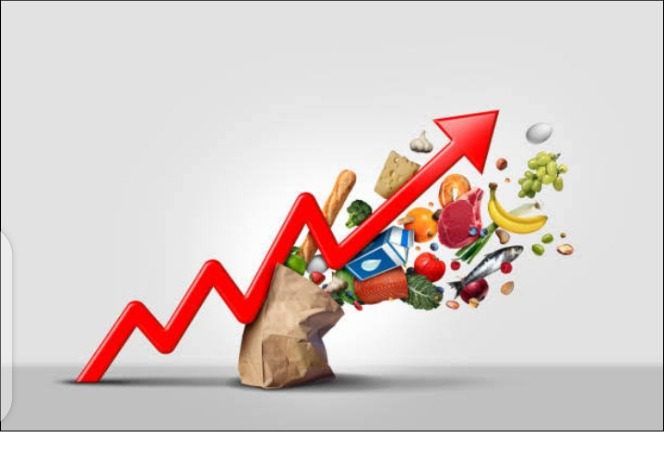Breaking News
BREAKING: Food inflation rises to 40%
“There will be an increase in bad loans as more SMEs will be unable to fulfill their loan obligations leading to decreased access to funding from banks that will be more averse to lending to SMEs particularly with the increased interest rate, now coupled with inflation.

Nigeria reported a historically high food inflation rate of 40% in March 2024 against the backdrop of ongoing price increases for market staples.
The average Nigerian’s purchasing power will be further strained by this event, according to economists and financial analysts, who also forecast that the trend will persist for several months before settling.
The headline inflation rate increased to 33.2 percent in February from 31.7 percent in February due to food inflation.
In its Consumer Price Index (CPI) report for March 2024, the National Bureau of Statistics (NBS) issued data yesterday that showed increases of 2.09 and 1.5 percentage points month over month.
However, the analysts predict that this month’s headline inflation rate will rise to 34.6 percent, a 2.4 percentage point increase month over month brought primarily by the recent increase in electricity prices.
Electricity tariff hike to drive further inflation – CardinalStone
Following the recent sharp increase in electricity prices, analysts at CardinalStone Finance Limited, an investment institution with headquarters in Lagos, suggested that more inflationary upswings could be anticipated.
The statement put forth was that there is an upward bias in the inflation outlook due to the recent installation of a new electricity tariff. For background, the price increase for Band A customers was made by the Nigerian Electricity Regulatory Commission (NERC) from N68 to N225 per kilowatt hour.
‘’Nevertheless, we see some downside risk from the recent currency sustainability. ‘’Overall, we project inflation to print 34.6% in April 2024.’’
In the meantime, analysts at Alpha Morgan Capital said: “From our analysis, we project that inflation will further increase but at a continuously slower rate. We tie this prediction primarily to the recent monetary interventions by the Central Bank of Nigeria in mopping up excess liquidity, curbing volatile exchange rate movement through various aggressive currency interventions, government fiscal policies, such as agricultural interventions, among others.”
Devpt is bad for businesses – NACCIMA
Meanwhile, OPS said that the persistent rising inflation could sound the death knell for small businesses in the country, with consequential loss of jobs and worsened insecurity.
Commenting, Director General of the Nigerian Association of Chambers of Commerce, Industry, Mines, and Agriculture (NACCIMA), Sola Obadimu, said: “Persistent rising inflation is bad for business as well as for individuals.
“It erodes income in value terms and purchasing power becomes weaker for both individuals and businesses. Inventories will continue to grow.
“It is bad for planning purposes and breeds growing uncertainty. Cost of doing business continues to grow leading to higher cost of goods. It’s cyclical.
“Even when businesses or individuals tend to earn higher income, the value (in real terms) becomes lower.”
In his reaction, President of Association of Small Business Owners of Nigeria (ASBON), Dr Femi Egbesola, said the development will worsen survival of small businesses.
He stated: “The new and rising inflation rate, affecting largely food, essential commodities, raw materials, electricity and alternative power generation, transportation among others, will continue to worsen the survival and growth of SMEs.
It will, no doubt, squeeze out the meager working capital of SMEs and make us more vulnerable to extinction.
“Not all costs can be passed to the consumers but even at that, certain costs will be passed onto them, and since they also have had their disposable income eroded by inflation, sales of goods and services of SMEs will drastically drop. For an average citizen, their standard of living and welfare will significantly drop too.
“More Nigerians will suffer from hunger, and lack of access to basic necessities and amenities, worse of it is health and medical needs.
“Overall, the implications of this on SMEs is that many more businesses will die off and become ailing, job losses will increase as many more businesses will lay off workers.
“There will be an increase in bad loans as more SMEs will be unable to fulfill their loan obligations leading to decreased access to funding from banks that will be more averse to lending to SMEs particularly with the increased interest rate, now coupled with inflation.
“More insecurity will prevail in the land for many will look for alternative illegal ways of survival. More will migrate in the name of Japa.
“The extinction of more businesses will open doors for imported products to take their space which eventually will also stress the Naira exchange rate.”
In its CPI report NBS stated: “In March 2024, the headline inflation rate increased to 33.2 percent relative to the February 2024 headline inflation rate which was 31.7 percent .
“On a YoY basis, the headline inflation rate was 11.16 percentage points higher compared to the rate recorded in March 2023, which was 22.04 percent.
On food inflation the bureau said: “The food inflation rate in March 2024 was 40.01 percent on a year-on-year basis, which was 15.56 percentage points higher compared to the rate recorded in March 2023 (24.45 percent).
“The rise in Food inflation on a year-on-year basis was caused by increases in prices of the following items garri, millet, akpu uncooked fermented (which are under the bread and cereals class), yam tuber, water yam (under potatoes, yam, and other tubers class), dried fish sadine, mudfish dried (under Fish class), palm oil, vegetable oil (under Oil and Fat), beef feet, beef head, liver (under Meat class), coconut, water melon (under Fruit Class), Lipton tea, Bournvita, Milo (under coffee, tea and cocoa class).”

















